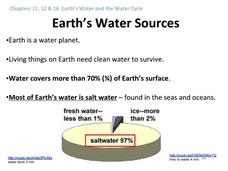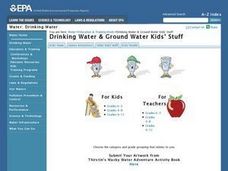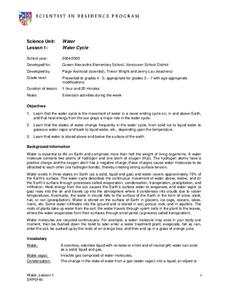US Environmental Protection Agency
Thirstin's Wacky Water Adventure
Make a splash with young scientists as you teach them all about water using this activity packet. Thirstin, a cartoon glass of water, walks children through the water treatment process, teaches them about different sources of water, and...
Baylor College
Can Nutrients in Water Cause Harm?
Ecology candidates culture pond water organisms over a few days time, then they experiment to find out how increasing nutrients affects the population. As part of a unit on water, this exploration gives your class an understanding of how...
Baylor College
How Do We Use Water?
Send youngsters home to survey how they use water in their homes. Then bring them together to discuss which uses are essential for our health and which are not. A helpful video offers teaching tips for this lesson, and a presentation...
Curated OER
The Hydrologic (Water) Cycle
Learners construct a model of the hydrologic cycle, and observe that water is an element of a cycle in the natural environment. They explain how the hydrologic cycle works and why it is important, and compare the hydrologic cycle to...
Baylor College
What Makes Water Special?
Get close up and personal with a drop of water to discover how the polarity of its molecules affect its behavior. Elementary hydrologists split and combine water droplets, and also compare them to drops of oil. Much neater than placing a...
Curated OER
Water Pollution
Fifth graders study the impact of human activity on water quality and on the ecosystems of Earth. After a discussion on the various ways that water can be polluted, groups of youngsters get together to figure out the best way to clean a...
Curated OER
Water Cycle Stories
Students explore the water cycle and associated phase changes. They predict what happens to the mass of an ice cube in a Ziploc bag, discuss and act out phase changes and diagram the water cycle.
Baylor College
What Dissolves in Water?
One of water's claims to fame is as the universal solvent. Young physical scientists experiment to discover which materials dissolve in this special compound. You could never be more prepared for teaching this lesson than by using this...
Curated OER
Earth's Water Sources
General facts about Earth's water sources, human use, and the water cycle are outlined by this presentation. Slide three has a grammatical error and slide nine refers to the local watershed of the author, so you will need to make a few...
Baylor College
Water: Post-Assessment
Very simply, the science class will discuss what they have learned during The Science of Water unit and take a multiple-choice post-assessment quiz. A few other closing activities are suggested for you to choose from, such as having...
Baylor College
Why Is Water Important? Pre-assessment
This water worksheet is just the tip of the iceberg! It a multiple-choice quiz meant to be a pre-assessment for a wonderful water unit. There are 10 questions to be answered regarding the role, properties, and behavior of water. Make...
Baylor College
How Much Water Do Humans Need?
Physical or life science learners measure the amounts of water eliminated by intestines and the urinary system, and the amounts lost via respiration and perspiration. In doing so, they discover that the body's water must be replenished...
Baylor College
What Is the Water Cycle?
Small groups place sand and ice in a covered box, place the box in the sunlight, then observe as evaporation, condensation, and precipitation occur. These models serve as miniature water cycles and demonstrations of the three phases of...
Curated OER
Bringing Water to a Village in Lesotho
Students research water in Lesotho. For this water lesson, students watch videos showing how water comes to Lesotho Africa, they will compare this to how water is acquired in the US. Students will then create a mobile showing the...
Curated OER
Water Pollution
Here is a fine lesson for fifth graders that will give them an idea of the variety of impacts that human-introduced pollutants have on the environment. After an initial class discussion and teacher-led demonstration, pupils brainstorm...
US Environmental Protection Agency
Aquifer in a Cup
Young scientists create their very own aquifers in this science lesson on ground water. After learning about how some people get their drinking water from underground wells, young learners use sand, modeling clay, and aquarium rocks to...
Curated OER
Restoring and Protecting Chesapeake Bay and River Water Quality
A professional and comprehensive presentation on Chesapeake Bay water quality is in store for your ecology class. If you live in the Chesapeake Bay region and want to get learners involved in conservation efforts, this slide show will do...
K12 Reader
Water Carves the Land
What affect do bodies of water have on the world around us? Kids can find out by reading this passage. After reading, they answer five questions related to the text.
NASA
The Case of the Wacky Water Cycle
Join the tree house detectives in learning about the processes of the water cycle, water conservation, water treatment, and water as a limited resource.
Curated OER
Youth Activity: How People Get Their Water Reservoirs: "Holding Tanks" for Drinking Water
Students experience and participate in "Riding the Water Cycle" with this lesson. They explore, analyze and study the role of reservoirs in maintaining a reliable supply of drinking water. Each student constructs a model of a reservoir.
Curated OER
Water Cycle
Young scientists explore Earth elements by conducting an experiment. They define water vocabulary terms such as condensation and precipitation. In addition, they conduct a water experiment in which they build a terrarium, so they can...
Curated OER
Conditioning and Storing Cut Flowers and Greens
Flower storage is an important topic if you are working with flowers. Consequently, this series of slides will be useful for those who are studying floral arranging. The information provided in this presentation could be used to enhance...
Baylor College
How Can We Find Out What Is in Water?
Using paper chromatography, water watchers discover that several substances might be dissolved even though they aren't visible. In this case, you will prepare a mixture of three different food colorings for them to experiment with. A...
Pennsylvania State University
Learn, Protect, and Promote Water
A hands-on activity helps learners explore the water cycle. After discussing how they use water, classes discuss water pollution and then move into a simulation where 20 pupils move through the water cycle based on description cards.

























